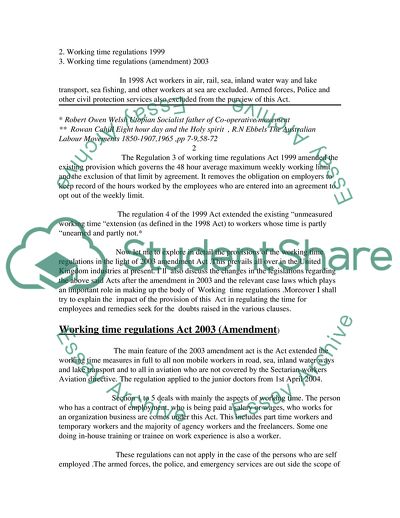Cite this document
(Impact of Legislations in Regulating the Working Time Essay Example | Topics and Well Written Essays - 1000 words, n.d.)
Impact of Legislations in Regulating the Working Time Essay Example | Topics and Well Written Essays - 1000 words. https://studentshare.org/law/1707639-employment-lawby-reference-to-relevant-legislation-and-case-law-explain-how-the-working-time-regulations-in-the-uk-regulate-working-time-include-a-discuss
Impact of Legislations in Regulating the Working Time Essay Example | Topics and Well Written Essays - 1000 words. https://studentshare.org/law/1707639-employment-lawby-reference-to-relevant-legislation-and-case-law-explain-how-the-working-time-regulations-in-the-uk-regulate-working-time-include-a-discuss
(Impact of Legislations in Regulating the Working Time Essay Example | Topics and Well Written Essays - 1000 Words)
Impact of Legislations in Regulating the Working Time Essay Example | Topics and Well Written Essays - 1000 Words. https://studentshare.org/law/1707639-employment-lawby-reference-to-relevant-legislation-and-case-law-explain-how-the-working-time-regulations-in-the-uk-regulate-working-time-include-a-discuss.
Impact of Legislations in Regulating the Working Time Essay Example | Topics and Well Written Essays - 1000 Words. https://studentshare.org/law/1707639-employment-lawby-reference-to-relevant-legislation-and-case-law-explain-how-the-working-time-regulations-in-the-uk-regulate-working-time-include-a-discuss.
“Impact of Legislations in Regulating the Working Time Essay Example | Topics and Well Written Essays - 1000 Words”. https://studentshare.org/law/1707639-employment-lawby-reference-to-relevant-legislation-and-case-law-explain-how-the-working-time-regulations-in-the-uk-regulate-working-time-include-a-discuss.


